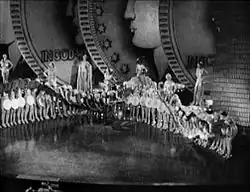The Gold Diggers' Song (We're in the Money)

"The Gold Diggers' Song (We're in the Money)" is a song from the 1933 Warner Bros. film Gold Diggers of 1933, sung in the opening sequence by Ginger Rogers and chorus. The entire song is never performed in the 1933 movie, though it introduces the film in the opening scene (wherein the performance is busted up by the police). Later in the movie, the tune is heard off stage in rehearsal as the director continues a discussion on camera about other matters.
The lyrics were written by Al Dubin and the music by Harry Warren. It became a standard with a well-known melody. It is one of the songs of the Broadway theatre's musical 42nd Street (musical).
Lyrics
The song's lyrics reflect a positive financial turnaround and a fantasized end to the Great Depression, which in the U.S. began to turn around in early 1933 but wouldn't actually end until the late 1930s:[1]
(Opening verse)
We're in the money!
We're in the money!
We've got a lot of what it takes to get along!
We're in the money!
The skies are sunny!
Ol' Man Depression, you are through, you done us wrong!
We never see a headline 'bout a bread line today,
And when we see the landlord,
We can look that guy right in the eye!
We're in the money!
Come on, my honey!
Let's lend it, spend it, send it rolling along!
Early versions
Early popular recordings of this song were performed by Ted Lewis & His Band and by Hal Kemp & His Orchestra. Dick Powell, who does not sing a note of "The Golddigger's Song" in the motion picture, recorded a version that also sold well.[2] Other 1933 versions were by The Dorsey Brothers (vocal by The Boswell Sisters),[3] and Leo Reisman and His Orchestra (vocal by Fred Astaire).[4]
Other recordings
- Bing Crosby recorded the song in 1954[5] for use on his radio show and it was subsequently included in the box set The Bing Crosby CBS Radio Recordings (1954–56) issued by Mosaic Records (catalog MD7-245) in 2009.[6]
- Connie Francis included the song on her album Connie & Clyde - Hit Songs of the 30s (1968).
- Rosemary Clooney included the song in her album Dedicated to Nelson (1996).
- Mihoko Tokoro performs a version of this song in Japanese for the 1996 film My Fellow Americans. This version also appears on the film's soundtrack album.
- American band the Cherry Poppin' Daddies recorded a version for their 2016 covers album The Boop-A-Doo.
In other Warner Bros. productions
"The Gold Diggers' Song (We're in the Money)" song was used again in several other other Warner Bros. productions. It appears as the theme song of the 1933 Merrie Melodies cartoon We're in the Money; and as the theme and source music two years later in the 1935 film, We're in the Money. It also appears in many other Warner Bros. cartoons with musical scores arragned by Carl W. Stalling and/or Milt Franklyn, often to underscore scenes where a character has gained a lot of money or thinks that they're about to.
The song also appears in the 1962 film The Chapman Report, played by a calliope at an amusement park. In the 1967 film Bonnie and Clyde, starring Warren Beatty and Faye Dunaway, the titular criminals hide out in a theatre where, the film being set during the Great Depression, Gold Diggers of 1933 is being shown. Bonnie (Dunaway) is enjoying the song, while Clyde (Beatty) is furiously reprimanding getaway driver C.W. Moss (Michael J. Pollard) after a bank robbery gone bad.
"We're in the Money" is also used as the car horn sound on the Rolls-Royce of Al Czervik (Rodney Dangerfield) in the 1980 film Caddyshack.
Media
It is played during the opening credits of Dillinger.[7]
On the first Simpsons episode, "Simpsons Roasting on an Open Fire", Bart and Barney sing the first three lines of the song.
In the Simpsons episode "HOMR", the first two lines of the song are sung by a chorus in Homer's head during a scene when he thinks that he'll get rich by investing in the stock market.
This song is also included in the Simpsons episode "Bart Stops to Smell the Roosevelts". The song played at the end of the auction.
The song was included in the stage adaptation of 42nd Street, along with other songs by Dubin & Warren, who wrote the songs for the original movie version.
The song is featured in the game Dance on Broadway.
In the Sopranos, the song is featured when Carmela is on the computer.
An orchestral version of the song is used to denote a strong day on Wall Street in the podcast Marketplace.
In the AMC show, Better Call Saul, the lawyer Saul Goodman whistles the tune to this song in Season 5, Episode 6 (Wexler v. Goodman).
The song was used as the theme tune by Lotto during 1988.
See also
References
- ^ Great Depression, Encyclopædia Britannica
- ^ Whitburn, Joel (1986). Joel Whitburn's Pop Memories 1890–1954. Wisconsin, USA: Record Research Inc. p. 503. ISBN 0-89820-083-0.
- ^ "The Online Discographical Project". 78discography.com. Retrieved October 7, 2017.
- ^ "The Online Discographical Project". 78discography.com. Retrieved October 7, 2017.
- ^ "A Bing Crosby Discography". BING magazine. International Club Crosby. Retrieved October 6, 2017.
- ^ "allmusic.com". allmusic.com. Retrieved October 6, 2017.
- ^ https://en.wikipedia.org/wiki/Dillinger_(1973_film)